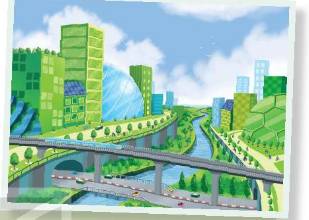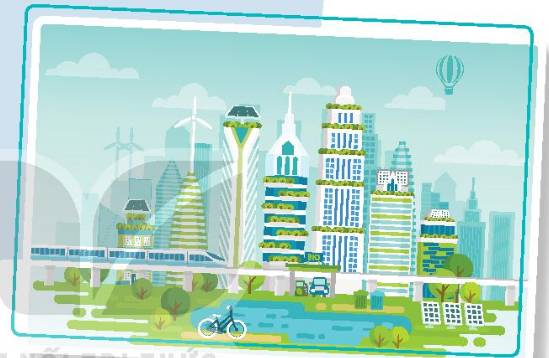Work in groups. Discuss what the cities of the future will be like and present your groups’ ideas to the whole class.
Hãy nhập câu hỏi của bạn vào đây, nếu là tài khoản VIP, bạn sẽ được ưu tiên trả lời.


1.
Future cities are likely to be more technologically advanced and densely populated than they are today.
(Các thành phố trong tương lai có thể sẽ có công nghệ tiên tiến hơn và đông dân cư hơn so với hiện nay.)
They may also be more sustainable, with green spaces and renewable energy sources.
(Chúng cũng có thể bền vững hơn, với không gian xanh và các nguồn năng lượng có thể tái tạo.)
There may be a greater focus on public transportation and walkability, rather than car-centric design.
(Có thể có sự tập trung nhiều hơn vào giao thông công cộng và khả năng đi bộ hơn là thiết kế tập trung vào ô tô.)
2.
Yes, I think future cities will be smarter and more sustainable.
(Vâng, tôi nghĩ các thành phố trong tương lai sẽ thông minh hơn và bền vững hơn.)
Technology will play a key role in optimizing resource usage, reducing waste, and improving efficiency.
(Công nghệ sẽ đóng một vai trò quan trọng trong việc tối ưu hóa việc sử dụng tài nguyên, giảm lãng phí và nâng cao hiệu quả.)
There is also a growing awareness of the need to reduce our impact on the environment, and sustainability will be a key consideration in urban planning and development.
(Ngoài ra còn có nhận thức ngày càng tăng về nhu cầu giảm tác động của chúng ta đối với môi trường và tính bền vững sẽ là yếu tố chính được xem xét trong quy hoạch và phát triển đô thị.)

In the cities of the future, there are many things that can help people to live a long and healthy life. However, access to green spaces and parks is arguably the most important. Green spaces can provide people with a place to exercise, relax, and enjoy nature, which can all contribute to improved mental and physical health. They can also help to mitigate the negative effects of pollution and noise, which are common in urban environments. Additionally, green spaces can promote social interaction and community cohesion, which can have positive effects on mental health. Therefore, it is important for future cities to prioritize the creation and maintenance of green spaces and parks to promote the health and well-being of their residents.

Option 1: Vocational Training
Suitable for: Students who prefer hands-on learning and practical application of skills. Vocational training is more focused on job-specific skills and can provide opportunities for immediate employment. This option is also suitable for students who are looking for shorter duration of study and want to save on the cost of education.
Option 2: Academic Study
Suitable for: Students who are interested in a broad range of subjects and want to develop critical thinking and research skills. Academic study provides a wider range of career paths and opportunities for pursuing advanced degrees. It also promotes personal and intellectual growth and helps build a strong foundation for future learning.
Ultimately, the choice between vocational training and academic study depends on the individual student's interests, goals, and learning preferences. Some students may find vocational training more suitable for their career goals, while others may prefer the broader education and research opportunities offered by academic study.

Our cultural heritage is a traditional craft that has been passed down from generation to generation in our community. To preserve it, we can organize workshops to teach the craft to younger generations. We can also hold exhibitions and fairs to showcase the craft to a wider audience and sell products made by local artisans. Another idea is to create a digital platform that connects artisans with customers and promotes their work.
Overall, we believe that it's important to involve younger generations in the preservation of cultural heritage and find ways to promote it to a wider audience. By doing so, we can ensure that our traditions and customs continue to thrive and evolve over time.
Our cultural heritage is a traditional craft that has been passed down from generation to generation in our community. To preserve it, we can organize workshops to teach the craft to younger generations. We can also hold exhibitions and fairs to showcase the craft to a wider audience and sell products made by local artisans. Another idea is to create a digital platform that connects artisans with customers and promotes their work.
Overall, we believe that it's important to involve younger generations in the preservation of cultural heritage and find ways to promote it to a wider audience. By doing so, we can ensure that our traditions and customs continue to thrive and evolve over time.
Tạm dịch:
Di sản văn hóa của chúng tôi là một nghề thủ công truyền thống đã được truyền từ thế hệ này sang thế hệ khác trong cộng đồng của chúng ta. Để bảo tồn nó, chúng ta có thể tổ chức các hội thảo để truyền dạy nghề cho thế hệ trẻ. Chúng ta cũng có thể tổ chức các cuộc triển lãm và hội chợ để giới thiệu nghề thủ công này cho mọi người đối tượng rộng hơn và bán các sản phẩm được làm bởi các nghệ nhân địa phương.Một ý tưởng khác là tạo ra một nền tảng kỹ thuật số kết nối các nghệ nhân với khách hàng và quảng bá công việc của họ.
Nhìn chung, chúng tôi tin rằng điều quan trọng là thu hút các thế hệ trẻ tham gia bảo tồn di sản văn hóa và tìm cách quảng bá di sản đó tới nhiều đối tượng hơn. Bằng cách đó, chúng tôi có thể đảm bảo rằng các truyền thống và phong tục của chúng tôi tiếp tục phát triển và phát triển theo thời gian.

To find extreme viewpoints, I need look no further than my own family. My family has members whose opinions vary widely. These opinions often result in interesting conversations, debates, and occasional disagreements at family gatherings. Two contrasting members of my family are my brother and my father. I understand both of them fairly well, but their attempts to understand each other are less successful. My father and my older brother sometimes assume diametrically different viewpoints.
My brother is artistic and creative while my father is pragmatic and technically minded. One of the more humorous differences between them is their taste in music. My brother is a born musician who loves music with soul. On the other hand, my father is a scientist and listens to Cheo.
Another often humorous difference between my father and brother is the way they wear their hair. My brother wears his hair down to his shoulders. My father, on the other hand, always gets his hair cut when it begins to touch his collar. When my father was growing up in the sixties, all men wore short hair. However, my brother grew up during the twenties when people were more liberal in the way they dressed. The length of my brother's hair bothers my father.
Although my brother and father disagree on many things, they manage to get along very well. Both of them are open-minded and can appreciate each other's differences.

There are some needed virtues that should be gained to be an independent person. Firstly, it is finding information skill that helps you think independently and make your own decisions. It promotes problem solving approaches and make you become a self-reliant person. Coping with loneliness is the second important virtue. Lacking this skill may make you feel depressed, and you are likely to make wrong decisions about your life. Last but not least, teens should learn how to set a goal and persistently pursue it. A teen who knows how to track his progress is possible to stay motivated. In short, equipping with above skills is a big step in preparing girls or boys for independence and leading a successful life in the future.

Cultural heritage is imperative. Culture is what defines us and what separates us from animals. To preserve the artifacts of our history for those that will come after us is a difficult task. There are many possible ways of doing so; in this essay, I am going to discuss two of them.
One way is to increase the budget of museums. This would allow them to become better equipped with tools that could be used to preserve their exhibits. It would also allow them to enrich their exhibition. However, museums may well become just another form of entertainment for young people, not teaching them why it is important to care about our history.
Another idea is to educate the young on the matter. This could make them do the job when we have long been gone. This may not give immediate results, but it would certainly be effective when looking at the problem in the big picture. We cannot forget that organizing an effective program can prove to be difficult to be implemented.
I trust the second option represents the approach that should be chosen. After all, history is about long-term solutions, and what future generations will do is just as important as our actions. Turning museums into pure entertainment, which is what might happen if the method mentioned in the second paragraph is applied, will render them devoid of the function we expect them to have.

Hi everyone, welcome to our Dream city. It's located in the western Vietnam and has an area of 50 square kilometer. There are 3 million people here. The main transport is green car and motor bike. Besides, modern public transport system is also developed to avoid traffic jams. We utilize modern waste treatment so that the air is not polluted. We also grow a lot of trees, which results in fresh atmosphere around the city. Educational system is supported by high technology, robot teacher, and distance learning is popular among students. Citizens here can enjoy the best health care services in the world and they need to work only 7 hours a day.

In my opinion, the skills and experience SSEAYP participants should have, ranked in order of importance, are:
1. Good English language skills
2. Understanding different cultures
3. Teamwork skills
4. Community work experience
5. Confident speaking skills
6. Understanding current issues in ASEAN countries.
Having good English language skills is essential since it's the working language of the program. Understanding different cultures is also important for effective communication. Teamwork skills are necessary for completing tasks and solving problems. Community work experience can be helpful in developing practical skills. Confident speaking skills are important for presenting ideas in front of an audience. Understanding current issues in ASEAN countries is important, but it is the least important skill or experience since the program focuses on cultural exchange and developing skills for the future.





Tham khảo:
The cities of the future will be different from the cities of today. They will be more advanced and sustainable, with green buildings and eco-friendly public transport. People will not need to use their own cars because the city infrastructure will be designed to support public transportation. The cities of the future will have smart technologies to make people's lives easier, such as AI assistants that can help with daily tasks. Overall, the cities of the future will prioritize the well-being of the environment and the people who live in them.